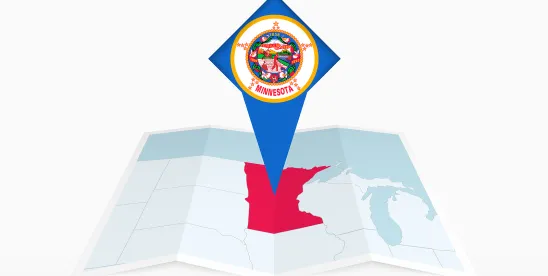A new Minnesota law taking effect on July 1, 2024, will ban the use of nonsolicitation agreements by staffing agencies and other service providers to prevent their customers, or the companies that contract for the staffing agency’s services, from soliciting or hiring the staffing agency’s employees who provide the contracted temporary services.
Quick Hits
- Minnesota’s new ban on the use of nonsolicitation agreements by service providers or staffing agencies takes effect on July 1, 2024.
- The law will prohibit service providers from restricting in any way its employees from being solicited or hired by user companies.
- The law will render such provisions void and unenforceable.
The new law, which was contained in Minnesota’s Labor and Industry Policy Omnibus bill signed by Governor Tim Walz on May 17, 2024, will prohibit any contractual provisions that restrict or restrain service providers’ user companies from directly or indirectly soliciting or hiring the service providers’ employees.
The law, Senate File (SF) 3852 / House File (HF) 3947 (Session Law 110), bans such provisions in contracts and agreements entered into on or after July 1, 2024, and states that such nonsolicitation provisions in “existing contract[s]” (i.e., contracts entered into prior to that date) are “void and unenforceable.” Further, service providers that entered into such contracts with customers prior to July 1, 2024, must notify their employees of the law and the restrictive covenant that violates it.
Service Providers
SF 3852 / HF 3947 law defines “service provider” broadly to encompass a range of companies that act “directly or indirectly as an employer or manager for work contracted or requested by a customer.”
However, the law does not apply to workers “providing professional business consulting for computer software development and related services who are seeking employment through a service provider with the knowledge and intention of being considered for a permanent position of employment with the customer as their employer at a later date.” In other words, a service provider may still prohibit its customer from hiring computer software development and related employees who seek employment with the service provider for the specific purpose of landing a permanent position with such a customer.
Restrictions
Further, SF 3852 / HF 3947 defines the types of prohibited restrictive covenants broadly, stating that service providers are prohibited from “restrict[ing], restrain[ing], or prohibit[ing] in any way a customer from directly or indirectly soliciting or hiring an employee of a service provider.” (Emphasis added.) This broad language would seemingly prevent service providers from charging user companies a penalty or fee if the user company hires the service provider’s temporary employees if such requirements are found to restrict or restrain the user company from hiring an employee.
Effective Date
Some commentators have written that the ban does not invalidate agreements entered into prior to July 1, 2024, because the law states that it “applies to contracts and agreements entered into on or after” July 1, 2024. However, the law also states that “existing contract[s]” are “void and unenforceable.” Therefore, while unclear, it appears that the Minnesota legislature intended to invalidate such agreements that were entered into prior to July 1, 2024, and to ban them thereafter.
Next Steps
The new restriction comes a year after Minnesota banned noncompete agreements effective July 1, 2023. The state is one of several jurisdictions to pass such restrictions in recent years, a trend that is impacting employers as many use noncompete agreements and other restrictive covenants to protect legitimate business interests.
Specifically, the new law will restrict employers in Minnesota that provide temporary workers for other user companies in trying to prevent those companies from hiring the providers’ employees. As a result, such affected employers in the state may want to review their employment agreements and customer contracts with respect to whether they restrict their customers from soliciting or hiring their customers. As noted, the law also voids all such existing agreements, and requires service providers that have such existing agreements to notify their employees of the new law and of the provisions that violate it.





 />i
/>i

